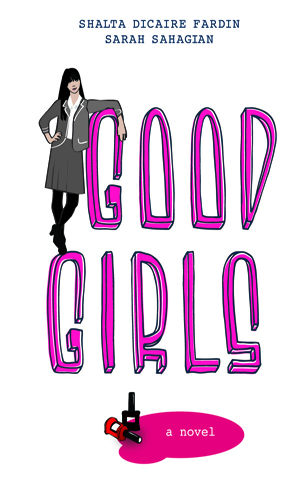| ________________
CM . . .
. Volume XXIII Number 19. . . .January 27, 2017
excerpt:
Good Girls is the first book in a series of contemporary feminist YA novels by Shalta Dicaire Fardin and Sarah Sahagian. The two authors have created a realistic narrative of privileged teens in Anne Bradstreet College or ABC, a prestigious all-girls Boston prep school. The novelís characters and setting are both well-developed and realistic. The novel depicts a balanced third person narration as its two tenth grade female protagonists, Allie and Octavia, are strongly developed. The narration also includes strong backstories for many other characters involved in the girlsí lives. Good Girls revolves around two very different protagonists as they come together as debate partners. One is the over-achieving perfectionist Allie Denning, the other is the reckless Octavia Irving, a girl from Montreal, who has been sent to live at ABC in order to stay out of the trouble and to change her partying ways. The two girls both live a life of privilege but have distinct family backgrounds. Octavia has always lived a life of luxury and privilege while Allie is privileged but also understands her motherís self-made background. Allie is an involved and enthusiastic member of the Debate Team while Octavia enters the team to fill an extra-curricular activity as suggested by her guidance counsellor. Throughout the story, Dicaire Fardin and Sahagianís writing seamlessly transitions between each protagonistsí point of view. Readers come to understand and sympathize with both Allie and Octavia who both begin as self-centred and then gain perspective of how they affect one anotherís lives while working together. Good Girls is a promising beginning to an engaging contemporary series for young adult readers. Apart from Allie and Octavia, the third person narration also gives readers a sense of many other people involved in the girlsí lives. Readers gain insight into the backgrounds of their friends, family, and faculty members in their school. The story develops well-rounded characters and also leaves much to be anticipated in terms of backstory for many of its characters in future novels. The writing is current in terms of dialogue where pop culture references are naturally woven into dialogue without seeming being forced for the sake of teen interest. The writing shows that the authors have a strong understanding of their contemporary audience. Dicaire Fardin and Sahagianís first book is a strong beginning to a series that teen readers will likely look forward to reading as they come to follow how Allie and Octavia navigate prep school life. Recommended. Vasso Tassiopoulos is a graduate of the Master of Arts program in Childrenís Literature at the University of British Columbia.
To comment
on this title or this review, send mail to cm@umanitoba.ca.
Copyright © the Manitoba Library Association. Reproduction for personal
use is permitted only if this copyright notice is maintained. Any
other reproduction is prohibited without permission.
Next Review | Table of Contents For This Issue - January 27, 2017 |
